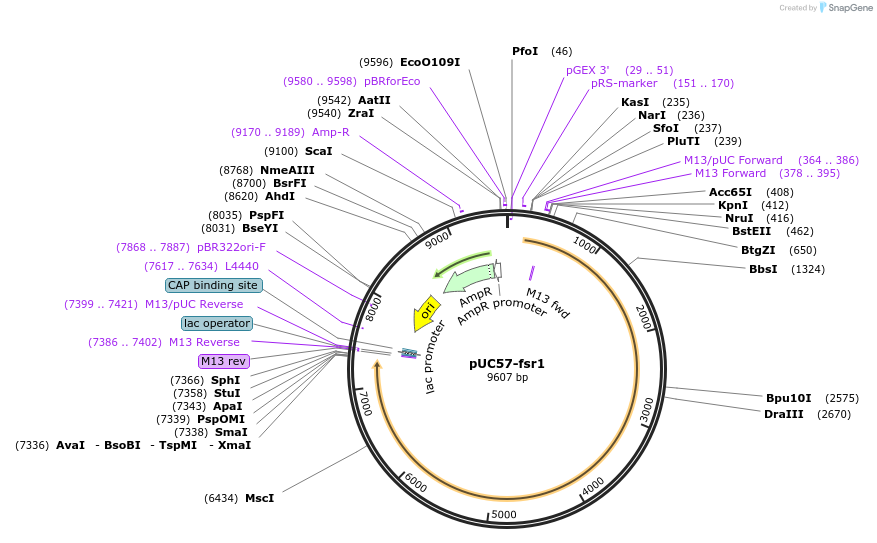pUC57-fsr1
(Plasmid
#179866)
-
PurposeEncodes the polyketide synthase Fsr1 from Fusarium vanettenii codon optimized for expression in Saccharomyces cerevisiae
-
Depositing Lab
-
Sequence Information
Ordering
| Item | Catalog # | Description | Quantity | Price (USD) | |
|---|---|---|---|---|---|
| Plasmid | 179866 | Standard format: Plasmid sent in bacteria as agar stab | 1 | $89 | |
Backbone
-
Vector backbonepUC57
-
Backbone manufacturerGenscript
- Backbone size w/o insert (bp) 2710
- Total vector size (bp) 9607
-
Modifications to backbone-
-
Vector typeSynthetic Biology
Growth in Bacteria
-
Bacterial Resistance(s)Ampicillin, 100 μg/mL
-
Growth Temperature37°C
-
Growth Strain(s)DH5alpha
-
Copy numberHigh Copy
Gene/Insert
-
Gene/Insert nameFusarubin polyketide synthase
-
Alt namefsr1
-
Alt namePKS3
-
SpeciesFusarium vanettenii 77-13-4
-
Insert Size (bp)6897
-
MutationCodon optimized for expression in Saccharomyces cerevisiae
-
GenBank IDNECHADRAFT_101778 EEU34216.1
Cloning Information
- Cloning method Unknown
- 5′ sequencing primer cccagtcacgacgttgtaaaacg
- (Common Sequencing Primers)
Resource Information
-
A portion of this plasmid was derived from a plasmid made byGene insert was synthesized by Genscript
Terms and Licenses
-
Academic/Nonprofit Terms
-
Industry Terms
- Not Available to Industry
Trademarks:
- Zeocin® is an InvivoGen trademark.
These plasmids were created by your colleagues. Please acknowledge the Principal Investigator, cite the article in which the plasmids were described, and include Addgene in the Materials and Methods of your future publications.
-
For your Materials & Methods section:
pUC57-fsr1 was a gift from Jens Laurids Sørensen (Addgene plasmid # 179866 ; http://n2t.net/addgene:179866 ; RRID:Addgene_179866) -
For your References section:
Yeast recombinational cloning for heterologous biosynthesis of polyketides: a molecular microbiology laboratory module for undergraduate students. Bejenari M, Nielsen L, Spedtsberg EML, Nielsen MR, Pedersen TB, Sorensen JL. J Microbiol Biol Educ. 2023 Nov 27;24(3):e00242-22. doi: 10.1128/jmbe.00242-22. eCollection 2023 Dec. 10.1128/jmbe.00242-22 PubMed 38108002



